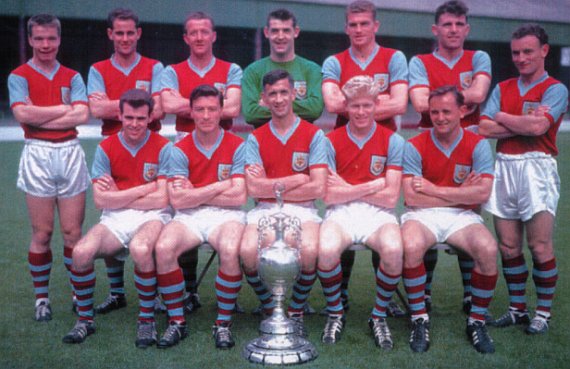|
It is something which really ought to happen, because this is a team so integral to the fabric of this club that that it would be remiss were it not to.
At the end of last season, at a dinner organised by this website, Paul Fletcher made an address to a packed Hamburg Suite which resonated with everyone who heard it. "This is one of the great clubs", he said, and he was absolutely right. This is a great club. Not because Burnley is an especially remarkable town. Not as a result of eight solid years of second tier football, nor because of the preceding twenty five years of meagre achievement. This is a great club because its forefathers achieved deeds which outstripped its modest background.
Burnley is a small town. Yet it has a football club with a roll call of honours which is the envy of clubs with four or five times its catchment. It isn't just that championship winning team; what is remarkable about Burnley's success is its longevity, either side of the First World War, through the whole of the 1960s and even into the 1970's.
That is what marks Burnley out from, say, Huddersfield Town, who never followed up their flash successes of the 1920's. That consistent overachievement created the brand, and spirit, which is the oxygen of our club in the 21st century. It is the reason why the club can claim, even now, to be better supported than the clubs of other comparable towns, such as Bury, Rochdale and Blackpool. It is why the Orient Game represented a reawakening of a proud club and not another scrap by a small town team to preserve league status. Burnley is often described as a football town, but success and fervour have a chicken and egg relationship.
Yet it is the team of the early 60's, which won that league championship, to which so many current Clarets can trace their affair with the club. I can, because my Dad can; he, like many others, first watched Burnley on television in the 1962 cup final. That team has become iconic of all that history of success. It carried the name of this club to far flung countries where it is still familiar. And it represents the crowning glory - a team with style and spirit and flair preserved in Technicolor for the generations like mine who were not alive to witness it in the flesh.
Even today, nearly 50 years on, the members of that team trip off the tongues of Burnley supporters. And on the golden anniversary of that triumph, the last significant anniversary upon which it may be possible, we should honour them.
We did so ten years ago, when the Jimmy McIlroy stand was finally blessed by the man who gave it his name, when he and his team mates were lauded on the Turf Moor grass. We have not done so since.
And yet, the only plausible objection to playing through next season in a commemorative kit is that we hark back too much. Do we? Is a once a decade celebration really indicative of an unhealthy obsession? At Anfield, Liverpool supporters walk through the Bill Shankly gates to sing about Steve Heighway playing on the wing. Bobby Charlton remains omnipresent at Old Trafford and a statue of Sir Matt Busby watches over the stadium. Arsenal played out their final season at Highbury in a kit designed to resemble that which they wore in their first season at the old stadium.
These are the most successful clubs in English football and they are not scared of embracing and celebrating their past glories. So why should we be? 50 years on from that Championship triumph, it is worth reflecting that no smaller town than Burnley has won the competition. Blackburn and Ipswich are the only other town clubs to have won it. Since the Second World War, only Portsmouth, Wolves, Derby and Nottingham Forest have done so from outside the established and enduring big city elite.
Place it in context and you realise the magnitude of the achievement. For a team as good as that team to wear the Claret and Blue of Burnley was nothing short of remarkable. It did so in the classic claret V-neck shirts, with blue trim and blue sleeves, white shorts and claret and blue socks: a kit unmistakeably ours; the uniform of the greatest team in our history.
Those teams gave us much to be proud of, but they also gave us the supporters of the present and the opportunity of a future. To revere that we were champions of England fifty years ago is not to wallow in the past. It is to celebrate the fact that, as our Chief Executive said, Turf Moor, Burnley, is home to one of the great clubs in English football.

